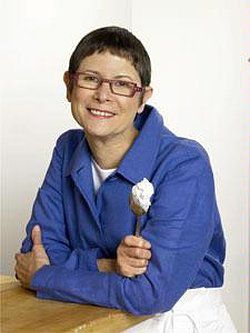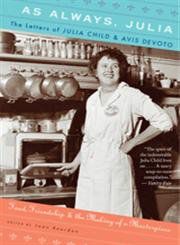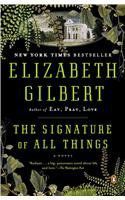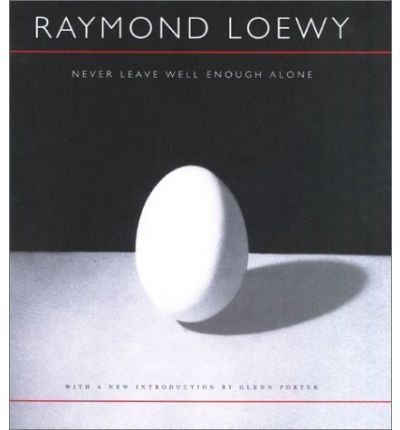
Dorie Greenspan
Dorie Greenspan is an American author of cookbooks. The New York Times called her a "culinary guru" in 2004.

Dorie Greenspan is an American author of cookbooks. The New York Times called her a "culinary guru" in 2004.

I read this when it first came out and was sad when I finished it - I immediately missed the companionship of these two creative, curious and caring women. I re-read the book soon after and treated myself to another read this summer. And each time I learned something about friendship, work, family, and yes, food and France. The book is a memoir, a biography, a culinary history, a treatise on friendship, a tale about what Julia used to call "cookbookery" and a treat - it is a pleasure to give yourself up to such good writing.
With her outsize personality, Julia Child is known around the world by her first name alone. But despite that familiarity, how much do we really know of the inner Julia? Now more than 200 letters exchanged between Julia and Avis DeVoto, her friend and unofficial literary agent memorably introduced in the hit movie Julie & Julia, open the window on Julias deepest thoughts and feelings. This riveting correspondence, in print for the first time, chronicles the blossoming of a unique and lifelong friendship between the two women and the turbulent process of Julias creation of Mastering the Art of French Cooking, one of the most influential cookbooks ever written. Frank, bawdy, funny, exuberant, and occasionally agonized, these letters show Julia, first as a new bride in Paris, then becoming increasingly worldly and adventuresome as she follows her diplomat husband in his postings to Nice, Germany, and Norway. With commentary by the noted food historian Joan Reardon, and covering topics as diverse as the lack of good wine in the United States, McCarthyism, and sexual mores, these astonishing letters show America on the verge of political, social, and gastronomic transformation.

I'm hesitant to say that I didn't finish Eat, Pray, Love because I don't want to be drummed out of town by the millions who adored it, but it wasn't a book for me. And so I was reticent about reading Signature, but the reviews were all so spectacular that it was a must. Thank you to every reviewer who was part of that almost universal nudge. The book is extraordinary: a long, deeply engrossing, generous and intriguing story that stayed with me and the many friends I recommended it to. I guess now is a good time to tell the editors whose deadlines I consistently missed for a few days this year that I wasn't sick -- I was reading this book!
Also recommended by: Markus Zusak
Spanning much of the eighteenth and nineteenth centuries, the novel follows the fortunes of the extraordinary Whittaker family as led by the enterprising Henry Whittaker--a poor-born Englishman who makes a great fortune in the South American quinine trade, eventually becoming the richest man in Philadelphia. Born in 1800, Henry's brilliant daughter, Alma (who inherits both her father's money and his mind), ultimately becomes a botanist of considerable gifts herself. As Alma's research takes her deeper into the mysteries of evolution, she falls in love with a man named Ambrose Pike who makes incomparable paintings of orchids and who draws her in the exact opposite direction -- into the realm of the spiritual, the divine, and the magical. Alma is a clear-minded scientist; Ambrose a utopian artist -- but what unites this unlikely couple is a desperate need to understand the workings of this world and the mechanisms behind all life. The story is peopled with unforgettable characters: missionaries, abolitionists, adventurers, astronomers, sea captains, geniuses, and the quite mad. But most memorable of all, it is the story of Alma Whittaker, who -- born in the Age of Enlightenment, but living well into the Industrial Revolution- bears witness to that extraordinary moment in human history when all the old assumptions about science, religion, commerce, and class were exploding into dangerous new ideas.

The man who just about invented industrial design may no longer be a household name, but every household still benefits from the work he did. The book was first published in 1951, when everywhere you turned in America -- at home, on the roads, on the rails, in department stores or at the newsstand (especially if you went in to buy a pack of Lucky Strikes (that iconic packaging was his) - you could see evidence of Loewy’s aesthetic, intelligence and practical creativity. The book seems as fresh today as it must have then. It’s part autobiography, part art book (he designed the volume), part biz book, part history of the American Century and all-over intriguing. And smart. I love that in France, where Loewy was born, the book’s title is: Ugly Doesn’t Sell. Indeed.
One of hte nation's leading industrial designers discusses his own life and accomplishments, from creating the Studebaker to designing the packaging for Lucky Strikes. (Fine Arts)